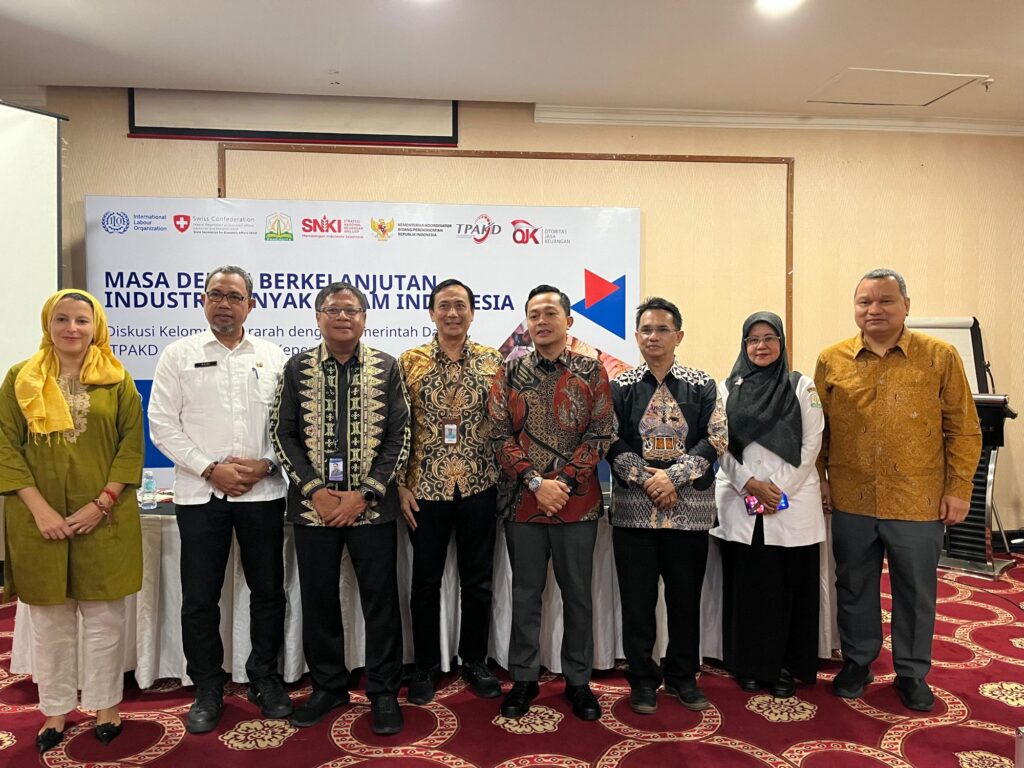Banda Aceh (Press Release) – The International Labor Organization (ILO), in collaboration with the Office of the Financial Services Authority (OJK) in Aceh and the Ministry of Coordination of Economic Affairs, the secretariat of the National Council for Financial Inclusion (DNKI), , is accelerating efforts to strengthen financial inclusion and digitize Aceh’s patchouli oil sector. The ILO is encouraging the development of new value chain ecosystems in the Aceh patchouli oil sector through the Promise II Impact Project, funded by the Swiss National Economic Secretariat (SECO), and is promoting digital enterprise resource planning. – We have strengthened it in the system. This initiative is in line with Indonesia’s National Strategy for Inclusive Finance (SNKI) as outlined in Presidential Decree No. 114 of 2020.
Participants in the national dialogue on strengthening regional economic sectors through essential oil products and financial access in Aceh (16/10) Copyright ILO Jakarta/2024
The Regional Financial Access Acceleration Team (TPAKD) Forum held at the Hermes Hotel Palace Aceh on October 16th, saw stakeholders raise awareness of the current challenges across patchouli oil and help financial institutions address this high-level challenge. It served as a platform to discuss how we can support. Increase the value of commodities through better access to financial products and services and further promote the newly launched ERP system called MyNilam. The forum will also foster broader dialogue and sharing of experiences on how agricultural products such as patchouli can foster regional economic growth through a more inclusive financial ecosystem.
Friderika Widyasari Dewi, Chief Officer for Market Conduct Supervision, Financial Education and Consumer Protection at the Financial Services Authority (OJK), emphasized the importance of expanding financial access in the region. “The essential oil industry, especially patchouli, has tremendous potential for Aceh’s economic development. By improving financial access, we can help local farmers and small businesses tap into new markets and improve their livelihoods. We will help you improve,” she said in her keynote address.
The forum’s panel discussion included key experts including Jauhari Sitrus, ILO’s Promise II Impact Project Manager; Sharing his insights on the impact of this program on the digitalization of the patchouli sector, he said, “Through MyNilam, we are leveraging digital technologies to create transparency, improve operational efficiency and strengthen the value chain. This initiative supports smallholder farmers and helps integrate them into a more structured and sustainable ecosystem, resulting in sustainable financial access for patchouli farmers and adopters. You can get it.”
“Ensuring the desired financial inclusion outcomes and achieving the goals outlined in the SNKI will require good coordination between the various stakeholders,” said Mr. Erdillo, Deputy Assistant for Financial Inclusion and Sharia Finance at the Ministry of Economic Coordination. is essential and will ultimately lead to improved financial inclusion.” people’s lives. ”
Syaiffulah from Atsiri Research Center highlighted the role of research and innovation in supporting the growth of this sector. “By collaborating with research institutes, we can drive innovation and ensure that small and medium-sized enterprises in the patchouli sector are well-positioned to compete nationally and internationally,” he said.
Meanwhile, Mr. Feriyanto from Dewan Asiri Indonesia (DAI) spoke about the potential and challenges of this sector: But to make the most of this potential, financial barriers need to be addressed and farmers have access to credit and modern financial tools. ”
IL. Kat Huzaimah, head of the Aceh Provincial Agriculture and Plantation Office and member of parliament, echoed similar sentiments, noting that local governments play an important role in supporting farmers.
The forum also provided an opportunity to identify key challenges facing the sector, including limited access to formal credit and the need to expand digital adoption. Participants discussed possible action plans to address these issues at both regional and national levels. The goal is to develop a more inclusive financial ecosystem that supports smallholder farmers and increases the attractiveness of the sector to financial institutions.
The Promise II Impact project is currently in its second phase and aims to strengthen the capacity of financial service providers and SMEs in Indonesia’s productive sector. The program contributes to creating an enabling environment for inclusive economic growth and improved employment outcomes through digital transformation and value chain strengthening.
For more information, please contact us below.
Yanis Saputra | ILO Promise II Impact National Project Director | Email: yanis@ilo.org | Phone: +62 812 6990 092
Adeline Alexandra | ILO National Project Officer on Labor Rights in the Rural Sector | Email: alexandra@ilo.org | Telephone Number: +62 812 9329 3880

